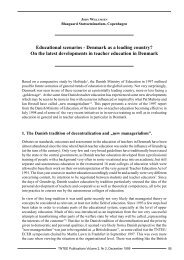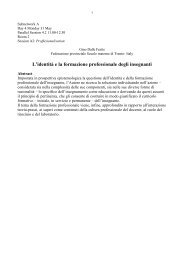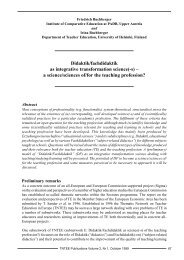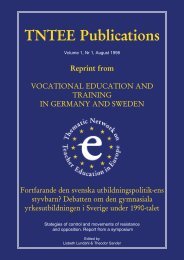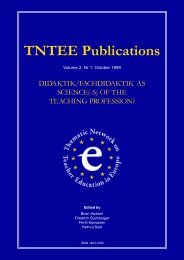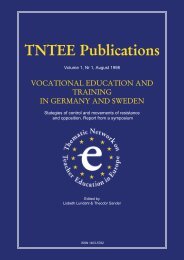Didaktik as the professional science of teachers - tntee
Didaktik as the professional science of teachers - tntee
Didaktik as the professional science of teachers - tntee
You also want an ePaper? Increase the reach of your titles
YUMPU automatically turns print PDFs into web optimized ePapers that Google loves.
86<br />
<strong>Didaktik</strong> <strong>as</strong> <strong>the</strong> <strong>pr<strong>of</strong>essional</strong> <strong>science</strong> <strong>of</strong> <strong>teachers</strong><br />
modified from being an executor <strong>of</strong> <strong>of</strong>ficial orders to being <strong>the</strong> responsible organizer/designer <strong>of</strong> a<br />
client-centred pedagogical service within <strong>the</strong> framework <strong>of</strong> school.<br />
These two contradictory positions – differing in individual countries – see <strong>the</strong>mselves <strong>as</strong> justified<br />
by <strong>the</strong> specific self-image <strong>of</strong> school administrations and <strong>the</strong>ir legal b<strong>as</strong>is <strong>as</strong> well <strong>as</strong> by culturespecific<br />
developments <strong>of</strong> scientific disciplines relevant and important for school and teaching.<br />
With regard to <strong>the</strong> intensity <strong>of</strong> <strong>the</strong> obligation put on <strong>teachers</strong> by syllabi and curricula, Stephan<br />
Hopmann (1998) suggested <strong>the</strong> following categorization: <strong>the</strong> philanthropic model, <strong>the</strong> licence model,<br />
<strong>the</strong> examen artium model and <strong>the</strong> <strong>as</strong>sessment model. School systems that use <strong>the</strong> licence model<br />
(framework syllabi with space for independent and self-determined teacher activity), are able to<br />
adapt more e<strong>as</strong>ily to new expectations <strong>of</strong> schools.<br />
Also <strong>the</strong> tradition <strong>of</strong> scientific disciplines that are responsible for <strong>the</strong> <strong>the</strong>ory <strong>of</strong> school and teaching,<br />
creates different conditions for <strong>the</strong> transition to <strong>the</strong> ‘new school’ and its <strong>the</strong>oretical b<strong>as</strong>is outlined<br />
above. In <strong>the</strong> German-speaking countries <strong>the</strong> concept <strong>of</strong> a ‘bildungs<strong>the</strong>oretische <strong>Didaktik</strong>’ w<strong>as</strong><br />
developed in <strong>the</strong> 1920s and 1930s (Weniger). Its b<strong>as</strong>is w<strong>as</strong> <strong>the</strong> ‘geisteswissenschaftliche Pädagogik’<br />
(Dil<strong>the</strong>y, Nohl) which, by regarding educational goals dependent on epoch and society, tried to<br />
overcome <strong>the</strong> normative character <strong>of</strong> pedagogy. Herbart and his contemporaries and successors<br />
viewed <strong>the</strong> aim <strong>of</strong> education <strong>as</strong> determined by ethics. In <strong>the</strong> so-called ‘pädagogischen Verhältnis’<br />
(pedagogical relationship), <strong>the</strong> core <strong>of</strong> all educational events, <strong>the</strong> educator is <strong>as</strong>signed <strong>the</strong> critical<br />
evaluation <strong>of</strong> educational aims and procedures expected by society with regard to <strong>the</strong> presence and<br />
future <strong>of</strong> <strong>the</strong> student. Criteria for evaluation and decision are developed through <strong>the</strong> scientific analysis<br />
<strong>of</strong> <strong>the</strong> ‘pädagogischen Verhältnis’ (pedagogical relationship).<br />
This fact demanded a relative pedagogical autonomy for school and <strong>teachers</strong>. The state w<strong>as</strong> expected<br />
to decree a framework syllabus to balance <strong>the</strong> interests between representatives <strong>of</strong> society and<br />
representatives <strong>of</strong> political power, which leaves <strong>the</strong> selection and emph<strong>as</strong>is <strong>of</strong> specific teaching<br />
content to <strong>the</strong> teacher and makes him/her responsible for independently selecting appropriate teaching<br />
methods.<br />
In <strong>the</strong> 1960s and 1970s this pedagogical and didactical tradition <strong>of</strong> ‘geisteswissenschaftliche<br />
Pädagogik’ became less influential in <strong>the</strong> German-speaking area and <strong>the</strong> Anglo-American concept<br />
<strong>of</strong> a teaching <strong>the</strong>ory w<strong>as</strong> imported. Its characteristics are <strong>the</strong> definition <strong>of</strong> teaching targets <strong>as</strong><br />
competencies and qualifications <strong>of</strong> <strong>the</strong> student by legitimized authorities (state, regional authorities,<br />
school boards) and <strong>the</strong> optimizing <strong>of</strong> learning processes by using <strong>the</strong>ories <strong>of</strong> learning. The <strong>the</strong>ory <strong>of</strong><br />
teaching is part <strong>of</strong> educational psychology (cf. Gage and Berliner 1997). <strong>Didaktik</strong> <strong>as</strong> <strong>the</strong> scientific<br />
b<strong>as</strong>is and action <strong>the</strong>ory <strong>of</strong> teaching does not exist; <strong>the</strong> word didactics refers to <strong>the</strong> ability <strong>of</strong> effectively<br />
executing <strong>the</strong> regulations for teaching with regard to contents and procedures (for <strong>the</strong> situation and<br />
development in <strong>the</strong> USA, cf. Doyle and Westbury 1992).<br />
According to Shulman, this position <strong>of</strong> a lesson-related instruction <strong>the</strong>ory is too limited for a scientific<br />
b<strong>as</strong>is for <strong>the</strong> <strong>pr<strong>of</strong>essional</strong> practice <strong>of</strong> <strong>teachers</strong>. He criticizes <strong>the</strong> exclusively psychologically oriented<br />
research that neglects important components <strong>of</strong> teaching (‘such <strong>as</strong> <strong>the</strong> subject matter being taught,<br />
<strong>the</strong> cl<strong>as</strong>sroom context, <strong>the</strong> physical and psychological characteristics <strong>of</strong> <strong>the</strong> students, or <strong>the</strong><br />
accomplishments <strong>of</strong> purposes not readily <strong>as</strong>sessed on standardized tests’, Shulman 1987, p.6).<br />
If you look at his categories <strong>of</strong> <strong>the</strong> fundamentals <strong>of</strong> knowledge for a successful teacher (Shulman<br />
1987, p.8: content knowledge – general pedagogical knowledge – curriculum knowledge –<br />
pedagogical content knowledge – knowledge <strong>of</strong> learners – knowledge <strong>of</strong> educational contexts –<br />
TNTEE Publications Volume 2, Nr 1, October 1999



